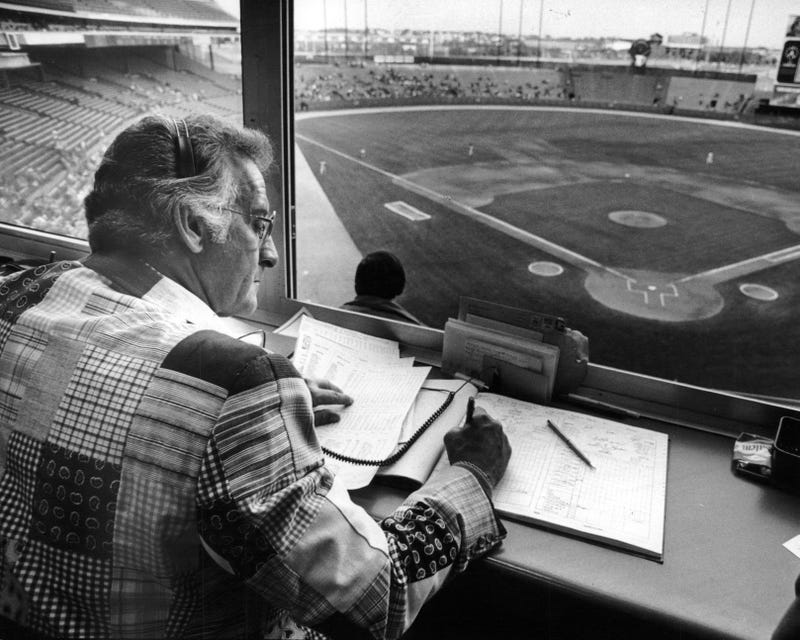
Two of Bob Uecker’s claims to fame — baseball and acting — came together brilliantly in one famous line:
“Juuuust a bit outside!”
Milwaukee fans could listen to Uecker broadcast Brewers games for over a half-century, but he showed off his play-by-play skills — and comedic talent — for more of a national audience when he appeared in the 1989 classic “Major League” as Cleveland announcer Harry Doyle.
The legendary broadcaster Bob Uecker passed at the age of 90 on Thursday. He spent 54 years calling games for the Milwaukee Brewers and one of the names he mentioned regularly was Hall of Famer and St. Paul native Paul Molitor.
Molitor spoke with WCCO's Chad Hartman and said there was no one like Bob.
"He just became bigger than anybody else in that clubhouse, Robin Yount or Rollie Fingers," Molitor said. "We flew a lot of commercial flights back then and you could get stopped in the airport. We would not. It was always quite chaotic for him, but it just kind of happened. And it was so natural for him."
Molitor also spoke about what "Ueck" meant to the organization, the city, and the state of Wisconsin.
"I think about the most famous sports figures in the history of the state of Wisconsin," he says. "You can go with the quarterbacks, you've got Starr and Favre and Rodgers. And then you got Lou Alcindor (Kareem Abdul-Jabbar), and you got Al McGuire. And you got all these people, and far away, I would say that Bob Uecker is at the top of that list."
Twins announcer Cory Provus also spent time in Milwaukee, working on the radio crew with Uecker. He told WCCO's Chad Hartman that Uecker would always take time after the game, and there was one thing he did on occassion to make fellow broadcasters feel special.
"As I'm starting the postgame show, he'd pack up his bag, and you're on the air," Provus explained. "And if you got that tap on your shoulder, didn't happen every night, but if you got that tap, like him saying goodbye, it was also like, 'good job.' I never forgot that. As time went by, I looked forward to that even more, when I'd get that tap from him. I'm getting all teary-eyed now."
Nationally, that fame skyrocketed when "Major League" came out.
“He made Harry Doyle the character it was,” David S. Ward, the movie’s director, said Thursday night. “In a way, he was kind of a narrator of the movie almost. The attitude he carried sort of infused the whole movie with a kind of comic irreverence.”
Uecker’s acting career also included his role on the ABC sitcom “Mr. Belvedere.”
“He was just a terrific man. He was funny, he was positive. He just had a certain spring in his walk, just a bundle of good energy,” Ward said. “His comic ability sometimes hid the fact that he was a very disciplined and very intelligent man. You could talk to him about anything. He was well versed in many areas of culture and events. It just wasn’t all baseball. But when it came to baseball, obviously he was an icon.”
Like many of the characters that made “Major League” a hit, Doyle was a caricature, wearing his hopes and frustrations on his sleeve as the home team bumbled through the start of the season and then stormed into contention. Uecker’s deadpanned delivery made his lines particularly humorous — and added some authenticity to the baseball scenes.
“Once I started writing it, I really couldn’t think of anyone else to do it,” Ward said. “I don’t know what I would have done if we didn’t get him.”
At one point in the movie, Ricky Vaughn — played by Charlie Sheen — threw a pitch so far outside it smacked off the backstop behind the plate. In an effort to sanitize the erratic right-hander’s performance for the local fans, Doyle called the pitch thusly: “Juuuust a bit outside! He tried the corner and missed.”
“He added the ‘tried the corner and missed.’ We’re shooting it and he says the line and then he adds that, and I go, ‘That is the perfect cherry on top of the sundae.’” Ward said. “People remember it because of the way Uecker said it, not because of the way I wrote it. Nobody could have said it the way he said it, and then added the line afterward that just made the landing even better.”
Uecker’s wit not only added to the movie, but it made him popular behind the scenes with the rest of the actors.
“He never had scenes with the other actors. He was always in the booth,” Ward said. “The other actors would come to set on the days that he was shooting, just because they wanted to be around him and the whole sort of comic and carefree kind of aura that he brought to anything. ... That’s rare. Usually actors want to take advantage of those days off.”
The Associated Press contributed to this story.
